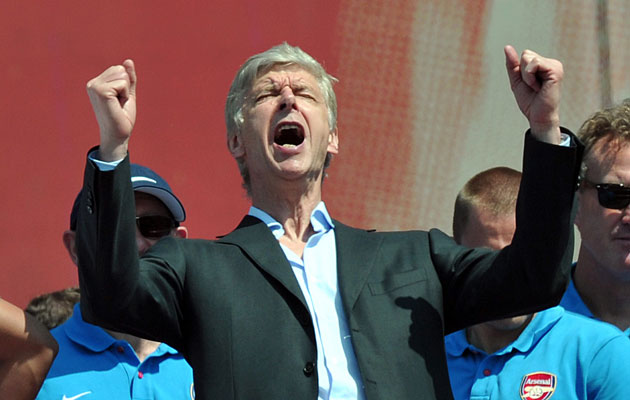What is this sudden effusion of Wenger worship? This quasi deification of him as a football genius after Arsenal so painfully ploughed their way to the FA Cup, their first major trophy for nine years?
Was it really a stroke of genius to wait until 105 minutes to bring on Jack Wilshere, England’s only decent passer of a ball, and the lively, talented Czech Tomas Rosicky. How was the ineffectual Mesut Ozil kept so long on the field with so negligible an impact; and come to think about it, was that vast £42 million fee essentially the product of panic in the late transfer window?
To me, who was there, it seemed decisive that Hull, after their vigorously bright beginning had largely run out of steam by half-time. That gloriously struck free-kick by Santi Cazorla had kept the Gunners in the game, but how far was he in it effectively himself?
And even late in extra time, with Hull on the ropes, they could easily have made it a breathless three goals when big, heavy Per Mertesacker fell down on his back, leaving quick little Sone Aluko an unimpeded run on goal – his fast low cross needing only the merest touch to score an equaliser.
When Hull went 2-0 up so dramatically, there were shades of the last time the teams had met in the FA Cup. That was in the 1930 semi-final at Leeds. Hull were hell bent on relegation to the 3rd Division, the Gunners, under Herbert Chapman were just getting into their stride. They were yet to win a trophy under the majestic Chapman. Three years earlier they had lost the Cup final to Cardiff with a farcical goal, when the ball rolled off goalkeeper Danny Lewis’ jersey and over the line for a solitary goal.
Now at Leeds, poor Lewis would blunder again. Kicking from hand a clearance that went a mere thirty yards, he watched unperturbed as the ball soared over his head, sure that it would clear the crossbar. Alas it didn’t. Hull had scored. And when left back and future England captain, Eddie Hapgood, sliced into his own goal, Hull led 2-0.
Hull had a player limping on the wing when Arsenal at last got back into the game with a goal by the celebrated David Jack. But time had almost run out when the celebrated teenaged prodigy, Cliff Bastin who, by his own subsequent admission hadn’t touched the ball for 20 minutes, glided through the Hull defence to equalise.
Arsenal won an ill-tempered return at Villa Park 1-0; Hull had their centre half Arthur Childs sent off. “Some of their players,” reflect Hapgood euphemistically, “tried to play without the ball.”
There is no doubt in his long years in charge Wenger has done great things for Arsenal, revolutionising the training and diet, finding a luxurious new training ground at London Colney, near to the previous training ground belonging to University College London.
Buying such stars as Thierry Henry and Patrick Vieira, perceptively making the far slighter and very young Cesc Fabregas successor to Viera, whom he would subsequently outclass in a European game at Highbury.
But although Sir Alex Ferguson was the triumphant exception who proved the rule, managerial success tends to be finite. No manager of an Italian club would have survived last season’s shocking defeats by Chelsea, Liverpool and Manchester City. The £42 million purchase of Ozil still seems in retrospect the product of panic. The chief executive, Ivan Gazidis, is a shrewd and successful money man. But where is the potential corrective? Wenger now has a new and colossal contract and £100 million to spend. But is he the manager he once was?
Sepp Blatter. Incorrigible. First he tells us he accepts it was a mistake – not his, admittedly – to give Qatar the World Cup but insisted he keep it. Now we hear he’s contributed some £19 million of FIFA money to a flattering film about his organisation. A genuinely objective one would be worths seeing.
if ever Joao Havelange, that gigantic manipulator now, like his ghastly son-in-law Ricardo Teixeira, dsigraced. Blatter is now sure of yet another four years as FIFA president. You’ll never clean out those Augean stables. Only complete abolition – we can hope and prey – would be sufficient.
Does one suspect the dubious hand of Teixeira, not long since chased out of his role as top banana of brazil’s World Cup organisation (and what does that, alas, tell you?) in the absurd choice of Manaus as a World Cup venue? Roy Hodgson was quite right to hope England wouldn’t have to play there in the appalling heat, but should never have said so.
Now they are in an overcrowded city, in general chaos, where traffic doesn’t move, hornets sting and crime is endemic.
The horrific Bradford City fire, which cost so many lives, has just been publicly commemorated. Yet neither club nor city was ever sanctioned for the accumulation of detritus beneath the floor of the stand that burned.







